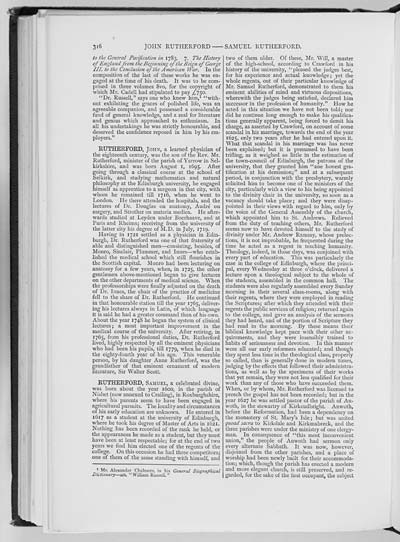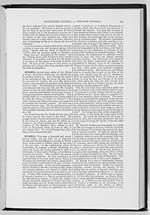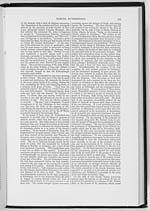Volume 3 > Half-Volume 5
(329) Page 316 - Rutherford, John
Download files
Individual page:
Thumbnail gallery: Grid view | List view

316 to the General Pacification in 1783. 7. The History of England from the Beginning of the Reign of George III to the Conclusion of the American War. In the composition of the last of these works he was en- gaged at the time of his death. It was to be com- prised in three volumes 8vo, for the copyright of which Mr. Cadell had stipulated to pay �750. "Dr. Russell," says one who knew him,1 "with- out exhibiting the graces of polished life, was an agreeable companion, and possessed a considerable fund of general knowledge, and a zeal for literature and genius which approached to enthusiasm. In all his undertakings he was strictly honourable, and deserved the confidence reposed in him by his em- ployers." RUTHERFORD, JOHN, a learned physician of the eighteenth century, was the son of the Rev. Mr. Rutherford, minister of the parish of Yarrow in Sel- kirkshire, and was born August I, 1695. After going through a classical course at the school of Selkirk, and studying mathematics and natural philosophy at the Edinburgh university, he engaged himself as apprentice to a surgeon in that city, with whom he remained till 1716, when he went to London. He there attended the hospitals, and the lectures of Dr. Douglas on anatomy, Audr� on surgery, and Strother on materia medica. He after- wards studied at Leyden under Boerhaave, and at Paris and Rheims; receiving from the university of the latter city his degree of M.D. in July, 1719. Having in 1721 settled as a physician in Edin- burgh, Dr. Rutherford was one of that fraternity of able and distinguished men�consisting, besides, of Monro, Sinclair, Plummer, and Innes�who estab- lished the medical school which still flourishes in the Scottish capital. Monro had been lecturing on anatomy for a few years, when, in 1725, the other gentlemen above-mentioned began to give lectures on the other departments of medical science. When the professorships were finally adjusted on the death of Dr. Innes, the chair of the practice of medicine fell to the share of Dr. Rutherford. He continued in that honourable station till the year 1765, deliver- ing his lectures always in Latin, of which language it is said he had a greater command than of his own. About the year 1748 he began the system of clinical lectures; a most important improvement in the medical course of the university. After retiring, in 1765, from his professional duties, Dr. Rutherford lived, highly respected by all the eminent physicians who had been his pupils, till 1779, when he died in the eighty-fourth year of his age. This venerable person, by his daughter Anne Rutherford, was the grandfather of that eminent ornament of modern literature, Sir Walter Scott. RUTHERFORD, SAMUEL, a celebrated divine, was born about the year 1600, in the parish of Nisbet (now annexed to Crailing), in Roxburghshire, where his parents seem to have been engaged in agricultural pursuits. The locality and circumstances of his early education are unknown. He entered in 1617 as a student at the university of Edinburgh, where he took his degree of Master of Arts in 1621. Nothing has been recorded of the rank he held, or the appearances he made as a student, but they must have been at least respectable; for at the end of two years we find him elected one of the regents of the college. On this occasion he had three competitors; one of them of the same standing with himself, and 1 Mr. Alexander Chalmers, in his General Biographical Dictionary�-art. "William Russell." two of them older. Of these, Mr. Will, a master of the high-school, according to Crawford in his history of the university, "pleased the judges best, for his experience and actual knowledge; yet the whole regents, out of their particular knowledge of Mr. Samuel Rutherford, demonstrated to them his eminent abilities of mind and virtuous dispositions, wherewith the judges being satisfied, declared him successor in the profession of humanity." How he acted in this situation we have not been told; nor did he continue long enough to make his qualifica- tions generally apparent, being forced to demit his charge, as asserted by Crawford, on account of some scandal in his marriage, towards the end of the year 1625, only two years after he had entered upon it. What that scandal in his marriage was has never been explained; but it is presumed to have been trifling, as it weighed so little in the estimation of the town-council of Edinburgh, the patrons of the university, that they granted him "ane honest gra- tification at his demission;" and at a subsequent period, in conjunction with the presbytery, warmly solicited him to become one of the ministers of the city, particularly with a view to bis being appointed to the divinity chair in the university, so soon as a vacancy should take place; and they were disap- pointed in their views with regard to him, only by the voice of the General Assembly of the church, which appointed him to St. Andrews. Relieved from the duty of teaching others, Mr. Rutherford seems now to have devoted himself to the study of divinity under Mr. Andrew Ramsay, whose prelec- tions, it is not improbable, he frequented during the time he acted as a regent in teaching humanity. Theology, indeed, in those days, was conjoined with every part of education. This was particularly the case in the college of Edinburgh, where the princi- pal, every Wednesday at three o'clock, delivered a lecture upon a theological subject to the whole of the students, assembled in the common hall. The students were also regularly assembled every Sunday morning in their several class-rooms, along with their regents, where they were employed in reading the Scriptures; after which they attended with their regents the public services of religion; returned again to the college, and gave an analysis of the sermons they had heard, and of the portion of Scripture they had read in the morning. By these means their biblical knowledge kept pace with their other ac- quirements, and they were insensibly trained to habits of seriousness and devotion. In this manner were all our early reformers educated; and though they spent less time in the theological class, properly so called, than is generally done in modern times, judging by the effects that followed their administra- tions, as well as by the specimens of their works that yet remain, they were not less qualified for their work than any of those who have succeeded them. When, or by whom, Mr. Rutherford was licensed to preach the gospel has not been recorded; but in the year 1627 he was settled pastor of the parish of An- woth, in the stewartry of Kirkcudbright. Anwoth, before the Reformation, had been a dependency on the monastery of St. Mary's Isle; but was united quoad sacra to Kirkdale and Kirkmabreck, and the three parishes were under the ministry of one clergy- man. In consequence of "this most inconvenient union," the people of Anwoth had sermon only every alternate Sabbath. It was now, however, disjoined from the other parishes, and a place of worship had been newly built for their accommoda- tion; which, though the parish has erected a modern and more elegant church, is still preserved, and re- garded, for the sake of the first occupant, the subject
Set display mode to:
![]() Universal Viewer |
Universal Viewer | ![]() Mirador |
Large image | Transcription
Mirador |
Large image | Transcription
Images and transcriptions on this page, including medium image downloads, may be used under the Creative Commons Attribution 4.0 International Licence unless otherwise stated. ![]()
| Biographical dictionary of eminent Scotsmen > Volume 3 > Half-Volume 5 > (329) Page 316 - Rutherford, John |
|---|
| Description | Spine title: Half-Vol. V. Macadam to Smith. |
|---|---|
| Description | Volume III. Contains names alphabetically from Macadam to Young. |
|---|

